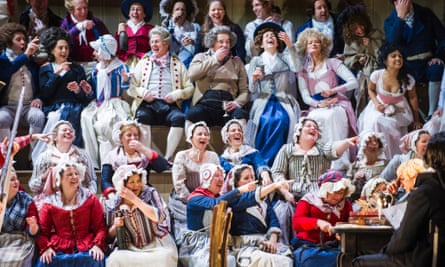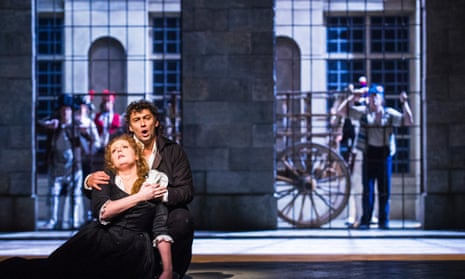The dropcloth for David McVicar’s new production of Andrea Chénier shows a bloody tricolour daubed with the words “Even Plato banned poets from his Republic” – written by Robespierre on the death warrant of the historical Chénier, a poet and journalist sent to the guillotine in 1794 for criticising France’s post-revolutionary government. Giordano’s 1896 opera, loosely based on the events that led to his execution, constitutes a demand for individualism that retains its clout: hearing it in the wake of the terrorist attacks in France is to be reminded once more of its relevance.
Given that it deals with lives caught up in a specific flashpoint in history, the opera works best when played straight, and McVicar wisely refrains from interpretative glosses. Giordano’s distaste for ancien régime kitsch, his distrust of mass political movements and his exploration of the creepy elation with which fervour tips into fanaticism are all realised with unfussy clarity. When Jonas Kaufmann’s Chénier calls for the replacement of systemic injustice with humanitarian values, his idealism is shown to be a disturbing political force that makes him dangerous to those round him. McVicar’s only lapse is the decision to turn the first-act pastoral into a big pas de deux after the fashion of Kenneth MacMillan’s Manon, which strikes a false note in a staging that otherwise prides itself on its attention to historical detail.

Kaufmann is performing the title role for the first time, and it’s hard to imagine him bettered. His striking looks make him very much the Romantic and romanticised outsider of Giordano’s vision. His voice, with its dark, liquid tone, soars through the music with refined ease and intensity: all those grand declarations of passion, whether political or erotic, hit home with terrific immediacy. His acting is superb, too, from the gauche, resentful bow with which he greets Rosalind Plowright’s vicious Countess di Coigny, to the slightly crazed rapture with which he goes to the guillotine with Eva-Maria Westbroek’s adoring Maddalena at his side.
With her voice taking time to settle on opening night, Westbroek, though wonderfully intelligent, proved less than ideal. The evening’s other great performance came instead from Željko Lučić as Gérard – a beautifully sung, handsomely acted portrait of a revolutionary politician facing the moral consequences of the private motivations that tarnish his integrity. Antonio Pappano’s conducting can be at times low-key – those grand passions could be grander sooner – but when he eventually lets rip in the final scene, the effect is overwhelming.
- In rep until 6 February. Box office: 020-7304 4000. Venue: Royal Opera House, London. The performance on 29 January will be live-streamed to cinemas in the UK and internationally.

Comments (…)
Sign in or create your Guardian account to join the discussion